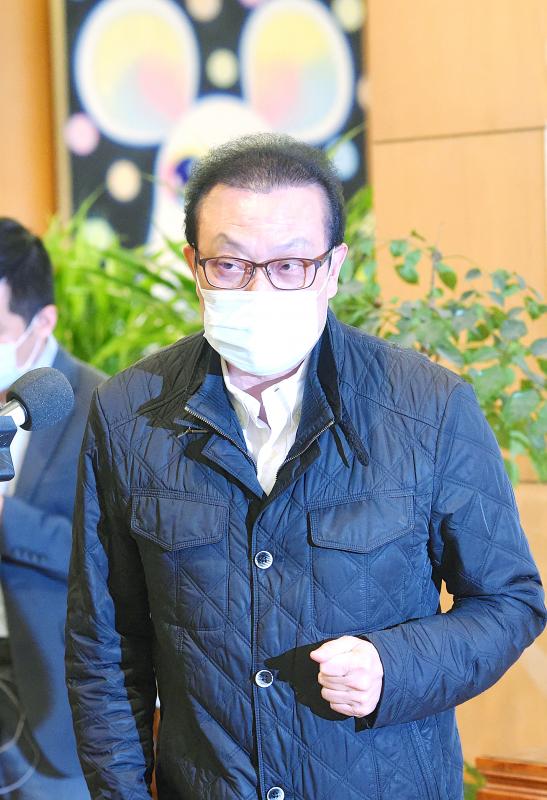Democratic Progressive Party (DPP) Legislator Su Chen-ching (蘇震清) yesterday announced that he was removing himself from the party until he clears his name in a bribery case.
“I am relinquishing my party membership to protect my beloved DPP, and to keep from causing trouble for top ministry officials,” he said, adding that he aimed to return after being proven innocent by the justice system.
Su, 56, has represented Pingtung County constituencies for four terms as a legislator.

Photo: Fang Pin-chao, Taipei Times
He has been accused of taking a NT$25.8 million (US$911,468 at the current exchange rate) bribe from former Pacific Distribution Investment Co chairman Lee Heng-lung (李恆隆) in a dispute over the ownership of the Pacific Sogo Department Store chain.
Su was one of five former and current lawmakers indicted last year on corruption charges.
Detained in August last year, Su was late last month released on NT$10 million bail.
Su told a news conference yesterday in Taipei that he would focus on serving his constituents in his capacity as a legislator, and that he has no plan to stand in the election for Pingtung County commissioner next year.
Although the corruption case has been a setback, observers had said that Su might run as an independent candidate.
A run by Su as an independent would likely split the DPP vote, political commentators had said.
Local residents had said that Su has the firm support of a number of local groups, despite being implicated in the bribery case.
Additional reporting by CNA

Alain Robert, known as the "French Spider-Man," praised Alex Honnold as exceptionally well-prepared after the US climber completed a free solo ascent of Taipei 101 yesterday. Robert said Honnold's ascent of the 508m-tall skyscraper in just more than one-and-a-half hours without using safety ropes or equipment was a remarkable achievement. "This is my life," he said in an interview conducted in French, adding that he liked the feeling of being "on the edge of danger." The 63-year-old Frenchman climbed Taipei 101 using ropes in December 2004, taking about four hours to reach the top. On a one-to-10 scale of difficulty, Robert said Taipei 101

Taiwanese and US defense groups are collaborating to introduce deployable, semi-autonomous manufacturing systems for drones and components in a boost to the nation’s supply chain resilience. Taiwan’s G-Tech Optroelectronics Corp subsidiary GTOC and the US’ Aerkomm Inc on Friday announced an agreement with fellow US-based Firestorm Lab to adopt the latter’s xCell, a technology featuring 3D printers fitted in 6.1m container units. The systems enable aerial platforms and parts to be produced in high volumes from dispersed nodes capable of rapid redeployment, to minimize the risk of enemy strikes and to meet field requirements, they said. Firestorm chief technology officer Ian Muceus said

MORE FALL: An investigation into one of Xi’s key cronies, part of a broader ‘anti-corruption’ drive, indicates that he might have a deep distrust in the military, an expert said China’s latest military purge underscores systemic risks in its shift from collective leadership to sole rule under Chinese President Xi Jinping (習近平), and could disrupt its chain of command and military capabilities, a national security official said yesterday. If decisionmaking within the Chinese Communist Party has become “irrational” under one-man rule, the Taiwan Strait and the regional situation must be approached with extreme caution, given unforeseen risks, they added. The anonymous official made the remarks as China’s Central Military Commission Vice Chairman Zhang Youxia (張又俠) and Joint Staff Department Chief of Staff Liu Zhenli (劉振立) were reportedly being investigated for suspected “serious

American climber Alex Honnold is to attempt a free climb of Taipei 101 today at 9am, with traffic closures around the skyscraper. To accommodate the climb attempt and filming, the Taipei Department of Transportation said traffic controls would be enforced around the Taipei 101 area. If weather conditions delay the climb, the restrictions would be pushed back to tomorrow. Traffic controls would be in place today from 7am to 11am around the Taipei 101 area, the department said. Songzhi Road would be fully closed in both directions between Songlian Road and Xinyi Road Sec 5, it said, adding that bidirectional traffic controls would